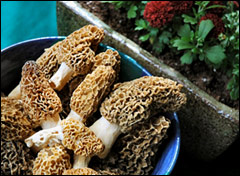local food
-
How to green your wedding
No one wants to scrimp on matters of the heart. And not a lot of lovebirds want to pass up the chance to throw a meaning-laden bash with friends, family, and bubbly that ends in a sex-crazed vacation. Who could say no to that? But when it comes to weddings, there are greener ways to […]
-
An interview with The ‘Stache pre-pie-in-the-face
Yes, Tom Friedman came to Brown University on Earth Day to unveil his new book and got hit by a pie.
 But he cleaned himself up, came back with a joke about surviving Beirut and Jerusalem but running into trouble in Providence, and went on to deliver a stem-winder of an address for an op-ed columnist essentially outlining his latest book.
But he cleaned himself up, came back with a joke about surviving Beirut and Jerusalem but running into trouble in Providence, and went on to deliver a stem-winder of an address for an op-ed columnist essentially outlining his latest book.I found The World Is Flat to be a good window into business models in the 21st century. His new offering, Hot, Flat, and Crowded: Why We Need a Green Revolution -- and How It Can Renew America, promises to be a cogent lassoing and explication of many of the biggest things that matter in the 21st century. Friedman chooses as the crucial drivers: energy supply and demand, climate, the spread of democracy versus petro-authoritarianism, biodiversity, and energy poverty.
A few bits from Friedman's speech to look forward to in Hot, Flat, and Crowded and when he returns to columns this month:
- The McCain gas tax holiday: A "dumb as we want to be" approach to energy policy.
- On high oil prices and petro-dictatorship: With oil at $25 per barrel, Bush looked into Putin's eyes and saw his soul. At $100 per barrel, look into Putin's eyes and you'll see "all the instruments of democracy he's swallowed."
- Did Reagan bring down the USSR -- or was it the decline in oil prices from $80 per barrel to $14.50?
- And finally, China as the Speed bus, except that it must switch from a diesel to a hybrid engine without going below 50 miles an hour. (That's the first thing since The Matrix that makes you aspire to be Keanu Reeves, isn't it?)
Before his speech, I had the chance to catch up with Friedman and ask him a few questions. The short interview is below:
-
More than peak oil or financial crash, I fear angry men armed to the teeth
“I urge readers to use less than lethal means when safe and practicable, but at times there is not a satisfactory substitute for well-aimed lead going down range at high velocity.” — James Rawles, SurvivalBlog With oil and food prices reaching all-time highs and food riots breaking out in the global south, a bit of […]
-
It’s happening, reports The New York Sun
Is the U.S. on the brink of food rationing? Possibly. Reports The New York Sun: Major retailers in New York, in areas of New England, and on the West Coast are limiting purchases of flour, rice, and cooking oil as demand outstrips supply. It’s hard to know what to make of the report, though. The […]
-
Growing your own food is fine, but governmental action is needed, and soon
I like Michael Pollan -- really, I do -- which is why it was frustrating to see his wilted-salad-green entreaty to act on climate change in yesterday's paper:
The climate-change crisis is at its very bottom a crisis of lifestyle -- of character, even. The Big Problem is nothing more or less than the sum total of countless little everyday choices, most of them made by us (consumer spending represents 70 percent of our economy), and most of the rest of them made in the name of our needs and desires and preferences.
For us to wait for legislation or technology to solve the problem of how we're living our lives suggests we're not really serious about changing -- something our politicians cannot fail to notice. They will not move until we do. Indeed, to look to leaders and experts, to laws and money and grand schemes, to save us from our predicament represents precisely the sort of thinking -- passive, delegated, dependent for solutions on specialists -- that helped get us into this mess in the first place. It's hard to believe that the same sort of thinking could now get us out of it.Pollan's grand solution? Plant a vegetable garden!
-
A bright trend for dark times: kitchen gardening
Last week, we ran a guest post about a topic dear to my heart: serious home vegetable gardening. In that piece, Bill Duesing argued that the USDA should take home food production seriously, by providing research and extension services to gardeners. Now Anne Raver, the veteran New York Times garden writer, has come out with […]
-
The legislation isn’t perfect, but it’s far better than extending the 2002 bill
With the new farm bill languishing in the last stages of negotiations, many are bemoaning its lack of sweeping reform, suggesting that we have gained very little from months and years of work.
But if the new bill is not to be the visionary document that many hoped and advocated for, what, if anything, do we stand to lose if the new bill is vetoed or negotiations reach an impasse and the 2002 farm bill is extended for two years?
There are several small but important gains that we are poised to win if the new farm bill gets passed, making it an improvement over the underlying bill from 2002. These improvements include provisions that support local and regional food systems, organic production and research, beginning farmers, nutrition, and the environment, and they are the reason why Congress should pass a new farm bill.
These bright spots in an otherwise murky and massive bill are not likely to induce a major change to our broken-down food system, but they are seeds we must plant for greater reform and broader transformation in the years to come.
-
Why Michael Pollan and Alice Waters should quit celebrating food-price hikes
As their grocery bills rise, Americans should take comfort: the price they’re paying for industrially produced food in the supermarket is starting to approach that of artisanally produced food at the farmers’ market. And that might make more of them choose healthier, less environmentally destructive diets. At least, that’s the message of an article in […]
-
The burrito giant buys pork from celebrity farmer Joel Salatin
Chipotle Mexican Grill used to be, but no longer is, partly owned by McDonald’s. It runs 700 restaurants nationwide — with plans to roll out 125 more this year — and is considered one of the nation’s fastest-growing “casual dining” chains. And it seems earnestly interested in sourcing ingredients from small- and mid-sized farmers near […]

